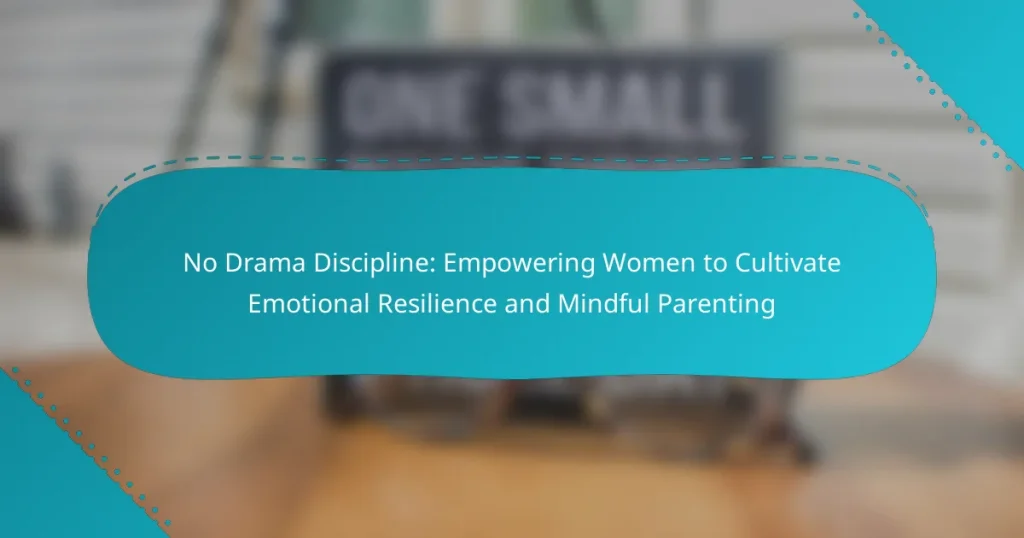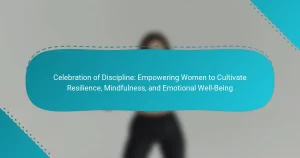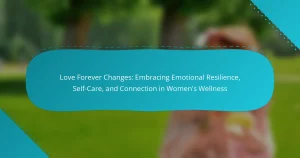No Drama Discipline empowers women to cultivate emotional resilience and practice mindful parenting. This approach promotes self-awareness and emotional regulation, enhancing coping strategies. It encourages empathetic communication and problem-solving, fostering a nurturing environment for children. Women can overcome unique challenges by integrating specific strategies that support their parenting journey.
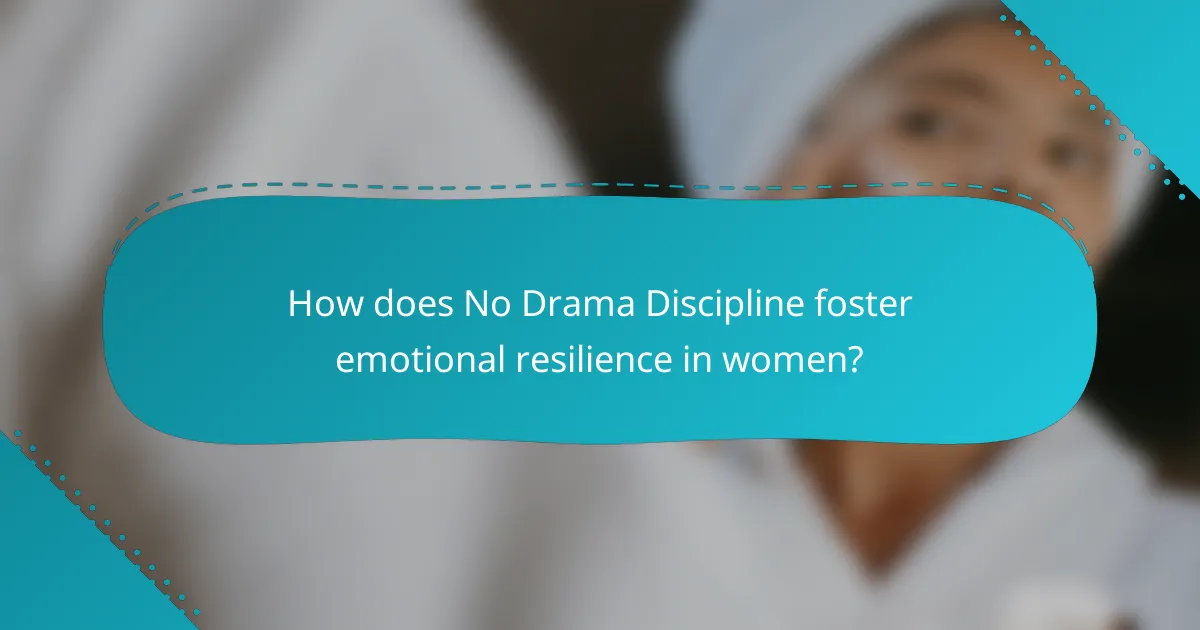
How does No Drama Discipline foster emotional resilience in women?
No Drama Discipline fosters emotional resilience in women by promoting self-awareness and emotional regulation. This approach encourages women to respond to challenges mindfully, enhancing their coping strategies. By focusing on understanding emotions rather than reacting impulsively, women develop stronger resilience. Techniques such as empathetic communication and problem-solving empower them to navigate parenting challenges effectively. This method cultivates a nurturing environment that supports emotional growth and resilience.
What are the key principles of No Drama Discipline?
No Drama Discipline emphasizes empathy, connection, and understanding in parenting. Its key principles include maintaining a calm demeanor, focusing on the child’s emotional needs, and fostering a supportive environment for growth. This approach encourages parents to model emotional regulation, allowing children to learn resilience and mindfulness through positive interactions. By prioritizing connection over correction, No Drama Discipline nurtures strong relationships and emotional intelligence in children.
How does emotional resilience impact women’s mental health?
Emotional resilience significantly enhances women’s mental health by fostering coping mechanisms and reducing stress. This quality enables women to navigate challenges more effectively, promoting overall well-being. Research indicates that resilient women experience lower rates of anxiety and depression. Additionally, emotional resilience contributes to healthier relationships, as it encourages effective communication and empathy. Cultivating this trait through practices like mindfulness can lead to improved emotional regulation and a more balanced life.
What are the stages of emotional resilience development?
The stages of emotional resilience development include awareness, acceptance, and action. Awareness involves recognizing emotions and triggers. Acceptance means understanding and validating feelings without judgment. Action focuses on implementing strategies to cope and adapt effectively. These stages empower women in mindful parenting and enhance overall emotional resilience.
What role does self-awareness play in emotional resilience?
Self-awareness is crucial for building emotional resilience, as it enables individuals to recognize and understand their emotions. This understanding helps women in mindful parenting by allowing them to respond rather than react to challenges. Increased self-awareness leads to better emotional regulation, reducing stress and enhancing coping strategies. As a result, women can cultivate a nurturing environment that fosters resilience in both themselves and their children.
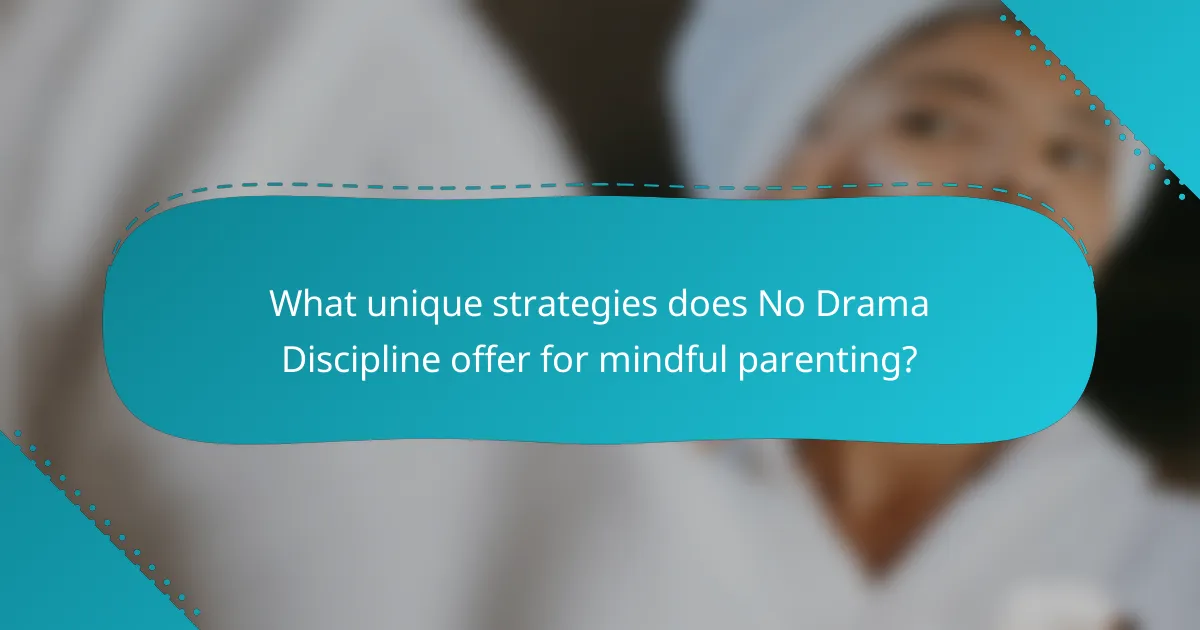
What unique strategies does No Drama Discipline offer for mindful parenting?
No Drama Discipline offers unique strategies that enhance emotional resilience and promote mindful parenting. These strategies include fostering connection through empathy, encouraging emotional regulation, and focusing on the learning process rather than punishment. By emphasizing understanding and communication, parents can cultivate a supportive environment that nurtures children’s emotional growth. This approach empowers women to embrace their parenting journey with confidence and mindfulness.
How can mindful parenting improve parent-child relationships?
Mindful parenting enhances parent-child relationships by fostering emotional connection and understanding. It encourages parents to respond thoughtfully rather than react impulsively, promoting a supportive environment. This approach nurtures children’s emotional resilience, leading to improved communication and trust. Research shows that mindful practices can reduce stress and increase parental satisfaction, benefiting the overall family dynamic. By modeling mindfulness, parents empower their children to develop self-regulation skills, further strengthening their bond.
What techniques promote emotional regulation in children?
Techniques that promote emotional regulation in children include mindfulness practices, consistent routines, and open communication. Mindfulness helps children recognize and manage their emotions. Establishing routines provides a sense of security, while open communication encourages expressing feelings. These strategies empower children to develop emotional resilience.
How can parents model emotional resilience for their children?
Parents can model emotional resilience by demonstrating healthy emotional regulation and problem-solving skills. They can openly discuss their feelings with children, showing vulnerability and the importance of expressing emotions. Encouraging children to face challenges rather than avoid them fosters resilience. Practicing mindfulness techniques, such as breathing exercises, helps both parents and children manage stress effectively. Additionally, sharing personal experiences and coping strategies reinforces the value of resilience in everyday life.
What are effective communication strategies for parents?
Effective communication strategies for parents include active listening, clear expression of feelings, and maintaining a calm demeanor. These methods foster emotional resilience and promote mindful parenting. Active listening builds trust, while expressing feelings clearly helps children understand emotional contexts. Maintaining calmness during discussions models emotional regulation, essential for children’s development. Implementing these strategies enhances family dynamics and nurtures a supportive environment.
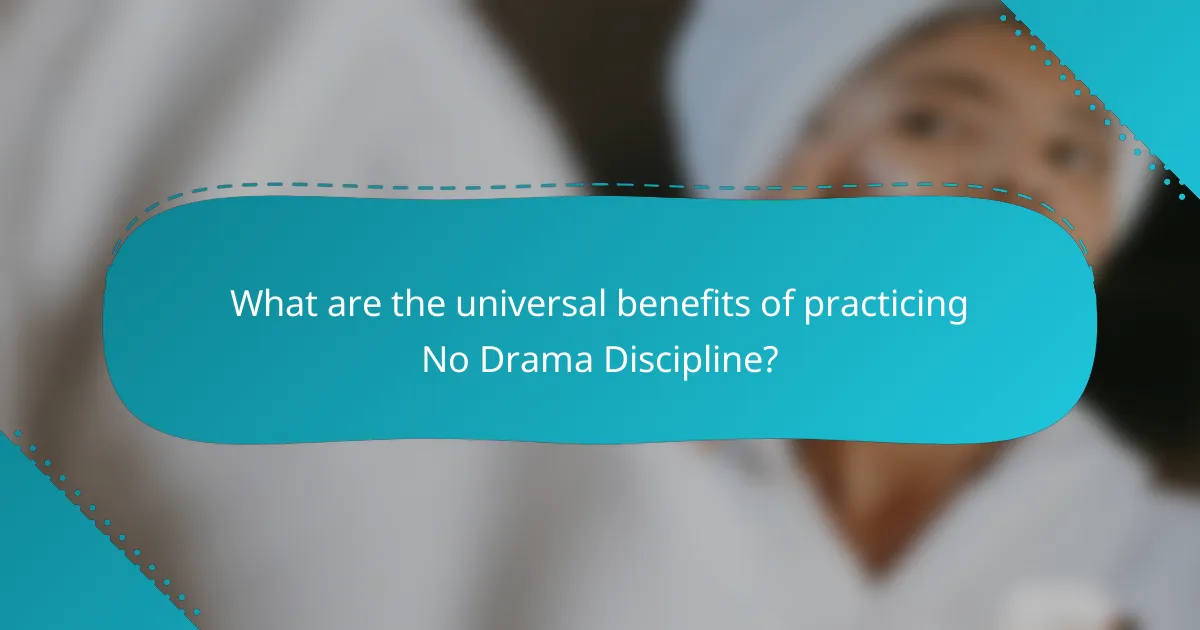
What are the universal benefits of practicing No Drama Discipline?
Practicing No Drama Discipline offers universal benefits such as enhanced emotional resilience, improved communication skills, and a positive parenting approach. These benefits empower women to manage conflicts calmly and foster stronger relationships with their children. Emotional resilience allows parents to navigate challenges effectively, while mindful parenting promotes a nurturing environment. As a result, families experience greater harmony and understanding.
How does this approach reduce stress for mothers?
This approach reduces stress for mothers by promoting emotional resilience through mindful parenting techniques. It encourages mothers to respond calmly rather than react impulsively, fostering a more harmonious family environment. By focusing on understanding children’s emotions, mothers can create stronger connections, which alleviates feelings of frustration. This empowerment leads to a unique attribute of increased self-awareness and improved coping strategies, enabling mothers to manage stress effectively. As a result, they experience greater fulfillment in their parenting journey.
What improvements can be seen in family dynamics?
Improvements in family dynamics include enhanced communication, increased emotional support, and better conflict resolution. Families practicing No Drama Discipline experience a shift towards mindfulness, fostering emotional resilience in both parents and children. This approach promotes a nurturing environment, leading to stronger relationships and reduced stress. As a result, family members feel more connected and understood, enhancing overall well-being.
How can No Drama Discipline enhance personal well-being?
No Drama Discipline enhances personal well-being by promoting emotional resilience and mindful parenting. It equips women with strategies to manage stress, improve communication, and foster deeper connections with their children. Research indicates that practicing mindful discipline reduces anxiety and builds confidence, enabling parents to respond rather than react. This approach cultivates a nurturing environment, enhancing overall family dynamics and individual well-being.
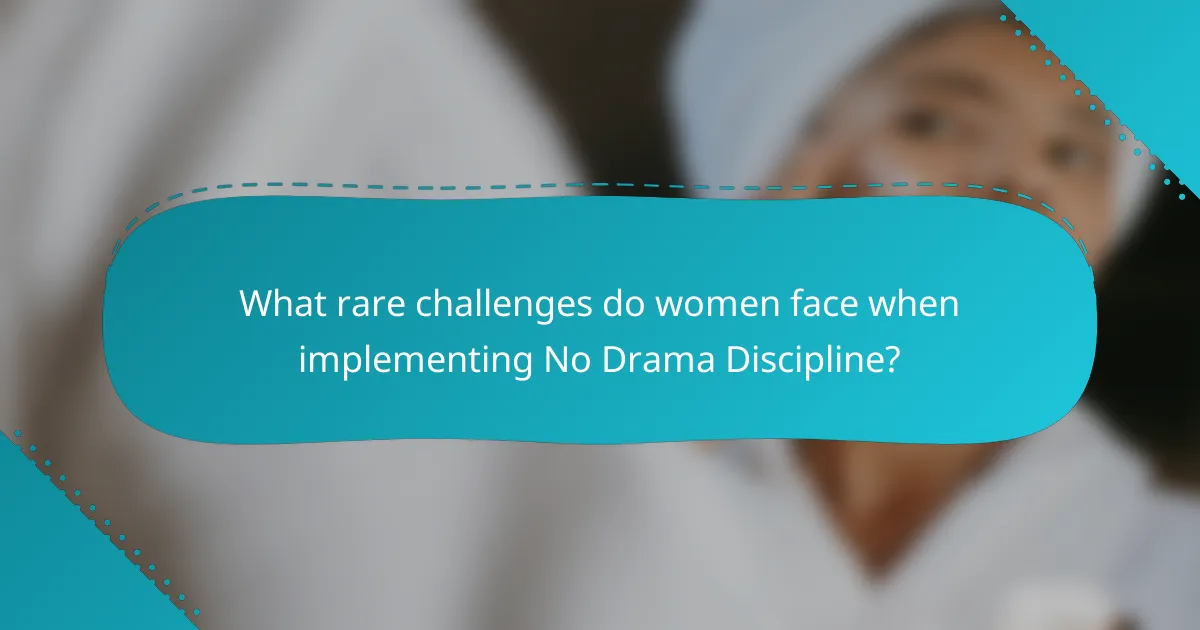
What rare challenges do women face when implementing No Drama Discipline?
Women face unique challenges when implementing No Drama Discipline, including societal expectations, emotional labor, and lack of support. These factors can hinder their ability to practice mindful parenting effectively. Societal norms often pressure women to conform to traditional disciplinary methods, which may conflict with the principles of No Drama Discipline. Emotional labor, such as managing feelings and maintaining a calm demeanor, can be overwhelming, especially in high-stress situations. Additionally, many women may lack adequate support systems, making it difficult to sustain these practices consistently. Addressing these rare challenges is essential for empowering women to cultivate emotional resilience and effective parenting strategies.
How can societal expectations impact women’s parenting styles?
Societal expectations significantly influence women’s parenting styles by shaping their beliefs and behaviors. These expectations often emphasize nurturing, emotional support, and the need for discipline, which can lead to stress and self-doubt. As a result, women may adopt mindful parenting techniques, such as those found in No Drama Discipline, to cultivate emotional resilience. This approach empowers women to balance societal pressures while fostering a supportive environment for their children. Studies show that mindful parenting can enhance parent-child relationships and improve children’s emotional regulation.
What are common misconceptions about No Drama Discipline?
Common misconceptions about No Drama Discipline include the belief that it promotes permissiveness, lacks structure, or is ineffective in addressing behavioral issues. In reality, No Drama Discipline emphasizes understanding and connection, fostering emotional resilience. It provides parents with tools to guide children through their emotions while maintaining boundaries. This approach encourages mindful parenting, enabling children to learn from their experiences rather than simply enforcing rules.
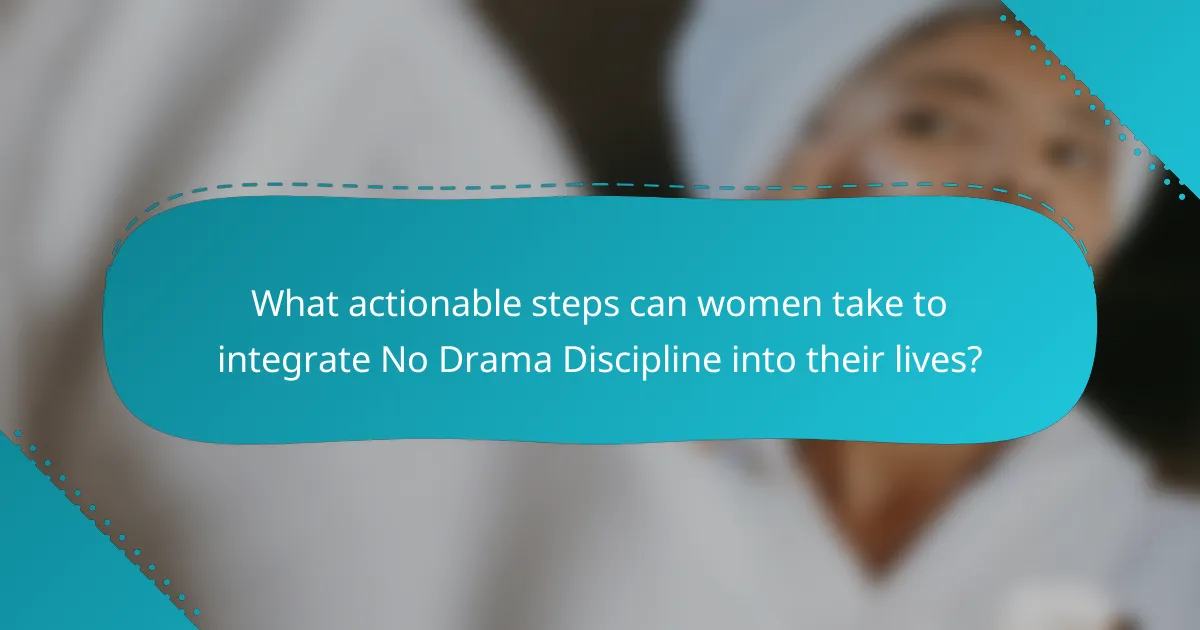
What actionable steps can women take to integrate No Drama Discipline into their lives?
Women can integrate No Drama Discipline into their lives by adopting specific strategies that foster emotional resilience and mindful parenting. Start by practicing self-regulation techniques, such as deep breathing or mindfulness exercises, to manage your own emotions. Establish clear and consistent boundaries for children, using calm communication to explain expectations. Encourage problem-solving skills by guiding children through conflict resolution instead of immediately providing solutions. Finally, prioritize reflective parenting by regularly assessing your responses and adjusting your approach based on what works best for your family.
What are best practices for applying these principles daily?
To apply No Drama Discipline principles daily, practice mindfulness, set clear boundaries, and model emotional resilience. Engage in self-reflection to understand triggers and respond calmly. Foster open communication with children, encouraging them to express feelings. Incorporate daily routines that emphasize empathy and problem-solving skills.
What common mistakes should women avoid when adopting this approach?
Women should avoid common mistakes such as reacting impulsively, neglecting self-care, and failing to set clear boundaries. These errors can undermine emotional resilience and mindful parenting. Prioritizing emotional regulation and practicing patience are essential for effective discipline. Additionally, seeking support from peers can enhance confidence and foster a positive environment.
How can women seek support and community in their parenting journey?
Women can seek support and community in their parenting journey through various avenues. Joining parenting groups, both online and offline, fosters connections with others who share similar experiences. Participating in workshops focused on mindful parenting enhances emotional resilience and provides practical strategies. Engaging with local community centers or parenting classes can also create supportive networks. Utilizing social media platforms allows for sharing challenges and successes, building a sense of belonging. These approaches empower women to cultivate a nurturing environment for themselves and their children.
